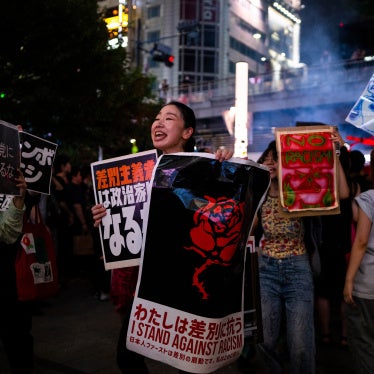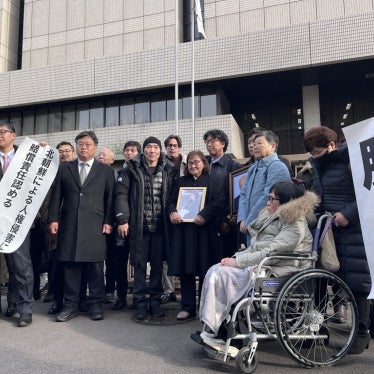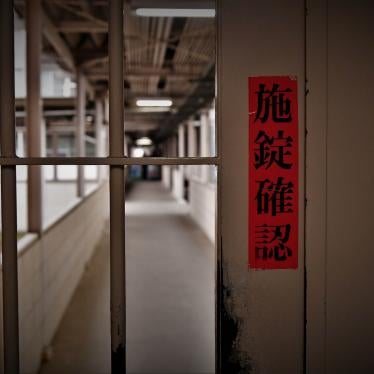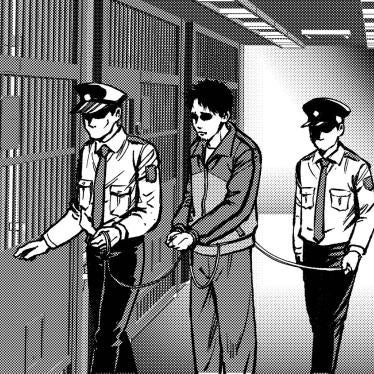1. We are aware of Japan’s official stance on human rights and diplomacy
(http://www.mofa.go.jp/mofaj/gaiko/jinken.html) as well as Prime Minister Shinzo Abe’s commitment on basic human rights, democracy, freedom and the rule of law (http://www.kantei.go.jp/foreign/96_abe/statement/201301/28syosin_e.html ).
a. Please identify the steps the Japanese government takes in order to translate the stated policies and commitment into action. Please give examples.
Japan has been advancing “diplomacy emphasizing universal values” including liberty, democracy, basic human rights and the rule of law, and has been actively working in the area of human rights. With a view toward making progress on the issue of human rights and humanity, Japan has been working through both the United Nations and bilateral human rights dialogues, and has also been engaging enthusiastically in various human rights activities, particularly in measures related to women’s empowerment and the promotion and protection of women’s rights, as an action to the global issues.
To say concretely,
1 Through discussions at the third committee of the UNGA and the Human Rights Council, Japan is making efforts to raise awareness of the international society in the field of human rights utilizing existing systems such as resolutions and Special Rapporteurs.
2 Through human rights dialogue with certain countries (Cambodia, Myanmar, Iran etc.) and other consultations, Japan is supporting each partner country’s/region’s efforts toward improving the situation of human rights especially in Asian countries.
3 In terms of the rights of women, as Prime Minister Shinzo Abe clearly stated in his address at the Sixty-Eighth Session of the General Assembly of the United Nations on 26 September, 2013, Japan established three pillars: 1. Facilitating Women’s Active Role /Participation in Society and Women’s Empowerment, 2. Enhancing Japan’s Efforts in the area of Women’s Health Care as a part of its Strategy on Global Health Diplomacy, 3. Supporting Women’s Participation and Protecting their rights in the area of Peace and Security. Japan will implement ODA in excess of US$3 billion over the next three years, targeting these pillars.
In addition, Japan is enhancing assistance for women’s empowerment and gender equality by close cooperation with relevant international organizations such as UN Women, UNDP, UNICEF, and UNFPA.
b. The principle of ODA implementation within Japan's ODA Charter states: "[f]ull attention should be paid to efforts for promoting democratization and the introduction of a market-oriented economy, and the situation regarding the protection of basic human rights and freedom in the recipient country." How does the Forien Ministry and JICA collect, compile and evaluate the situation of basic human rights and democracy in ODA recipient countries? Please be as specific as possible.
Japan provides assistance in compliance with the assistance philosophy of the ODA Charter, in consideration of the principles of the Charter of the United Nations as well as the principles of implementation of assistance including “Full attention should be paid to efforts for promoting democratization and the introduction of a market oriented economy, and the situation regarding the protection of basic human rights and freedoms in the recipient country” and after comprehensively considering such elements as the developing countries' need for assistance, socio-economic conditions, and bilateral relations with the recipient country.
In particular, enhancing the foundation of democracy in developing countries promotes citizen’s participation in governance and development and protection of human rights. In accordance with the ODA Charter, Japan has been assisting developing countries in development of human resource, law system and institution, and socioeconomic infrastructure, which constitute the foundation of development based on good governance in developing countries.
c. What standards does the Japanese government apply to promote democracy and human rights? If the standards are different from those found in international law, please identify those used.
To promote and protect human rights, Japan applies the rules coming from international human rights law including a number of human rights treaties which Japan concluded. Furthermore, when Japan interprets and applies such rules, Japan takes into consideration the resolutions and recommendations made by related international organizations or human rights fora, and seeks to do so in conformity with those rules of international human rights law as much as possible.
d. What action does the Japanese governemnt take to respond to alleged violations of these standards? Please provide examples from the past 10 years.
As mentioned above, Japan has been making efforts to raise awareness through both international human rights fora within the UN system and bilateral human rights dialogues. In addition, Japan has been taking every opportunity, such as UPR, other international conferences and bilateral meetings, to raise human rights issues.
2. Human Security
a. Please explain the meaning of this concept.
The General Assembly resolution 66/290 adopted on 10 September 2012 describes the common understanding of human security as "the right of people to live in freedom and dignity, free from poverty and despair. All individuals, in particular vulnerable people, are entitled to freedom from fear and freedom from want, with an equal opportunity to enjoy all their rights and fully develop their human potential.” Human Security calls for people-centered, comprehensive, context-specific and prevention-oriented responses that strengthen the protection and empowerment of all people and all communities. Human Security recognizes the interlinkages between peace, development and human rights, and equally considers civil, political, economic, social and cultural rights. The notion of Human Security is distinct from the responsibility to protect (R2P) and its implementation.
b. How is the concept of human security implemented to promote and protect human rights? Please give examples.
By focusing on the interconnected pillars of peace and security, development and human rights, Human Security provides a people-centered approach to comprehensively address the totality of the challenges and to translate efforts into actions that give rise to more effective and tangible improvements in the daily lives of people. Human Security requires protecting individuals and communities as well as empowering them so that they can mobilize their potential to cope with threats by themselves.
Since 1999, the United Nations Trust Fund for Human Security has played a critical role in promoting and protecting human rights through applying the Human Security approach. For example, the project entitled “Empowering and Rebuilding Communities with Multi-Sectoral Initiatives in Post-Conflict Chad for a Sustainable Change (2013-2015)” has contributed to protecting human rights of the most vulnerable persons through increased local ownership and empowerment with reinforcing rule of law, social support and capacity development.
c. Please identify gaps between "human security" and international human rights law.
The GA resolution 66/290 clarifies that Human Security does not entail additional legal obligations on the part of States by illustrating that “Human Security must be implemented with full respect for the purposes and principles enshrined in the Charter of the United Nations, including full respect for sovereignty of States, territorial integrity and non-interference in matters that are essentially within the domestic jurisdiction of States.”
Also, Human Security is not a domain-specific approach. As a people-centered and context-specific framework, a Human Security approach puts emphasis on the interlinkages among peace and security, development and human rights and facilitates comprehensive and multidimensional strategies.
d. Why are there gaps between the concept of human security and international human rights law?
Human Security is a framework that provides a practical and policy-oriented approach to integrate peace and security, development and human rights through protecting and empowering vulnerable persons. To ensure Human Security, 1)a bottom-up approach to meet the real needs on the ground, 2)a comprehensive and multi-sectoral approach to address various threats, 3) cooperation and coordination among various stakeholders (central and local governments, international organizations, civil society) is applied.
e. Will the government take steps to bring human security into conformity with international human rights law?
Human rights is one of three pillars of the United Nations, so the Member States are required to contribute to it along with the existing law. The Human Security approach gives expression to commitments related to three pillars including human rights. In addition, Human Security, as a holistic approach, offers an important framework to help accelerate progress towards achieving the future global objective of a life of dignity for all.
3. Environmental and Social Considerations (ESC)
JICA respects the principles of internationally established human rights standards such as the International Convention on Human Rights, and gives special attention to the human rights of vulnerable social groups including women, indigenous peoples, persons with disabilities, and minorities when implementing cooperation projects.
In order to implement such principles into individual projects, JICA follows the Environmental and Social Considerations Guidelines which describes the procedure and requirements in mitigation in order to avoid adverse environmental and social impacts from those projects. JICA expects that project proponents, etc. will meet these requirements. Depending on the nature of cooperation project, JICA provides support and examines if project proponents are in accordance with Sections 2 and 3 of the guidelines.JICA confirms that projects do not deviate significantly from the World Bank`s Safeguard Policies.
JICA has also established the Advisory Committee for Environmental and Social Considerations as an independent council composed of external experts with the knowledge necessary to provide advice regarding support for and examinations of the ESC of cooperation projects.
4. What is JICA’s view of the Rights-Based Approach (RBA) to development?
JICA considers human security to encompass the central component of RBA in that both philosophies see that all individual human are entitled to their human rights and drive to empower individual people and develop their government capacity to fulfill their rights.
JICA has also drafted a RBA reference material. The drafting procedure was conducted in accordance with expert consultation of civil group and academia through NGO-JICA Conference. The guide is available to public though the JICA website.
5. What training is given to foreign service officers, from ambassadors to entry-level positions, and JICA staff on international human rights standards? Please provide as much detail as possible.
JICA provides training on JICA ESC Guidelines which respects the principles of internationally established human rights standards to its own staff. Training on human security is also mandatory for all entry-level JICA staff.
The Ministry of Foreign Affairs provides lectures on human rights issues and human rights diplomacy as part of the training course for all entry-level officers. The MOFA also provides lectures on foreign relations and human rights issues as part of the training course for officers coming from other ministries who are newly appointed to work for its missions abroad as attachés.
6. What training is given to foreign service officers, from ambassadors to entry-level positions, and JICA staff about how to respond to complaints with JICA projects?
JICA trains its own staff to respond to complaints in compliance with the ESC guidelines.
7. Human Rights Watch and others receive complaints from affected communities that JICA does not do enough to address abusive practices by local government officials and their agents carrying out JICA projects. What is the procedure for identifying, preventing and responding to human rights-related problems in JICA projects? We are aware of the ESC guidelines, so we hope you can identify the steps you take to implement the guidelines, referring to as many examples as possible.
JICA understands that the environmental and social factors are affected by the social and institutional conditions of host countries and by the actual conditions of each project location. Therefore, as mentioned in JICA ESC Guidelines, JICA fully takes these conditions into account when examining environmental and social factors.
Based on JICA ESC Guidelines, projects must be adequately coordinated so that they are accepted in a manner that is socially appropriate to the country and locality in which they are planned. For projects with a potentially large environmental impact, sufficient and systematic consultations with local stakeholders, such as local residents, must be conducted via disclosure of information at an early stage, at which time alternatives for project plans may be examined. The outcome of such consultations must be incorporated into the contents of project plans.
Regarding non-compliance with the guidelines, JICA will respond directly to the local population's objections by an independent body that is established separately from project execution departments, in accordance with the Objection Procedures based on the ESC Guidelines.
8. How does JICA deal with conflicts between governments and project recipients? We would appreciate examples of how such cases have been handled.
a. The Cambodian government calls residents around some JICA project sites "squatters" in order to justify the forced relocation of residents, while residents and local nongovernment organizations (NGOs) and lawyers say they have the rights to ownership or possession and are being victimized by powerful interests and an ambiguous land law. How did the Japanese government deal with these situations? Under ESC guidelines, what steps will the Japanese government take to better protect rights?
Regarding the involuntary resettlement in Cambodia, JICA has been conducting capacity development to the Cambodia Government to enhance their institutional capacity to implement proper resettlement procedures. JICA will continue to assist the Cambodian government.
When conducting any JICA projects, JICA conducts surveys in line with the ESC Guidelines. According to such surveys, JICA has advised and persuaded the Cambodian government to cope with ESC issues adequately. JICA will continue to look over such issues cautiously and properly.
b. In JBIC's "Double-Double Track" project in Jakarta, Indonesia, which expanded the Java railway line, evicted residents were forced to sign false receipts for more compendation than they actually received, lost considerable personal property during evictions, and were intimidated by thugs prior to their eviction. In one instance, the eviction turned violent. The consultation between JBIC and Indonesian NGOs appears to have been insufficient. How did the Japanese government respond once it learned about these problems? What would the Japanese government do differently if this situation were to happen again to better protect rights?
Regarding the points in your report "Condemned Communities Forced Evictions in Jakarta", as replied in the letter from former JBIC on September 4, 2007, the Study conducted by University of Indonesia found that the socialization, payment and eviction process was properly conducted by executing agency of the Project and related municipalities based on the government of Indonesia's rules and regulations.
In April 2010, JICA issued the new "Guidelines for environmental and social considerations" to encourage the host country to have more appropriate consideration for environmental and social impacts by clearly mentioning the importance of "stakeholder participation, information transparency, accountability, and efficiency" in the Basic Principle and "appropriate participation by affected people" in the articles.
c. NGOs in Mozambique and Japan have been repeatedly calling on the Japanese government to review the ProSAVANA project in Mozambique, which may threaten the livelihood of small-scale farmers. A 2013 Human Rights Watch report showed how weak governance and limited safeguards in Mozambique mean that large-scale development projects, especially those involving resettlement, can lead to negative human rights impacts on local communities' access to food, water and work.
The Project on “Support of the Agricultural Development Master Plan for the Nacala Corridor in Mozambique” which is the Master Plan for ProSAVANA, aims to improve the livelihood of inhabitants of the Nacala Corridor, most of who are small scale farmers. To ensure human rights due diligence, the undergoing Master Plan Project will propose the monitoring and evaluation system implemented by the government of Mozambique to prevent infringement of farmers’ rights.
In terms of threat to livelihood of small-scale farmers, JICA understands that the Mozambique government never forces the farmers to transform the farming system from shifting cultivation to continuous farming nor change their cultivation crop. The Project will respect farmers’ decision on selection of farming system and their cultivation crop.
To ensure to prevent land acquisition related problems, JICA implements Strategic Environmental Assessment considering social impacts caused by land acquisition, involuntary resettlement, etc.
In accordance with JICA Guidelines for Environmental and Social Considerations, JICA tentatively classifies the Master Plan Project into the category B. JICA reviews the categorization accordingly after priority projects have been identified.
After the Master Plan is finalized and then JICA decides to provide further assistance for some priority projects based on official request from project proponents. JICA classifies those projects assisted by JICA into the category again based on more detailed information, and then examine appropriate environment and social considerations.
Indeed, in the Master Plan Project, the consultations with local stakeholders in total more than 50 times with about 2500 participants have been implemented in order to take into consideration their opinion to the Master Plan. The consultation will continue until the finalization of the Master Plan formulation process.
9. While there are some exceptions, which we appreciate, many MOFA and JICA officials in Tokyo and many diplomats, including at the ambassadorial level, say that Japan will not speak out on human rights issues partly to avoid harming relations with the host government. What are the reasons that Japan doesn’t use the combination of diplomacy, including public diplomacy, and the provision of development aid as a form of pressure to improve human rights?
Japan has been advancing diplomacy emphasizing liberty, democracy, basic human rights and the rule of law, and has been actively working for the improvement of each country’s situation of human rights.
In case there is the possibility that the basic human rights might be violated, Japan deals cautiously with implementing ODA by ensuring that ODA is used appropriately and also conveying to the recipient country its deep concern regarding the status of democratization and human rights in developing countries in accordance with ODA Charter.
End -








